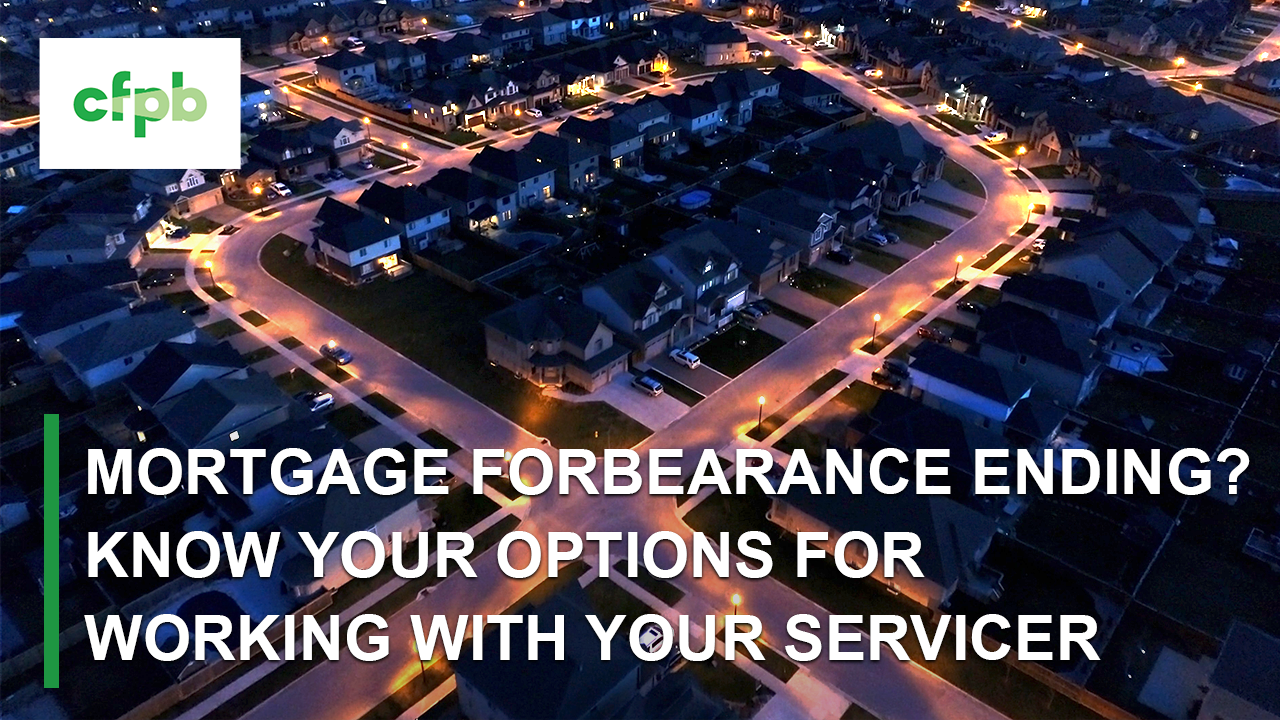New mortgage servicing rule aims to prevent avoidable foreclosures as protections expire
- English
- Español
During the COVID-19 pandemic, millions of Americans have been able to temporarily pause or reduce their mortgage payments under the CARES Act. However, in the coming weeks and months, those forbearance programs will begin to expire for some borrowers.
If you’re among the millions of Americans in forbearance and behind on your housing payments, you’re not alone. Even though your forbearance may be ending, a new rule goes into effect on August 31, 2021, that helps ensure your mortgage servicer is providing meaningful opportunities for you to avoid foreclosure and stay in your home. If you’re not in forbearance, mortgage relief options may still be available through your mortgage servicer.
2021 Mortgage Servicing COVID-19 Rule
Under the new rule, most mortgage servicers are required to take certain steps to help homeowners in forbearance find options for repaying their loan.
If you’re not sure whether you’d be able to make your payments once forbearance ends, talk with your servicer as soon as possible. They may have several options for you, including repaying your missed payments later. Servicers can also now offer some options without collecting a complete application from you, which may make it easier and faster for you to secure an affordable payment.
Before January 1, 2022, most servicers cannot start the foreclosure process—except in limited circumstances—without first reaching out to you and evaluating your complete application for options to help you avoid foreclosure. If your servicer makes contact with you near the end of your forbearance, they generally must tell you:
- The date your forbearance program will end
- Your options for repaying your missed payments and avoiding foreclosure
- Information on how to contact free housing counseling services
Note: these changes are temporary because they either include specific end dates or they’re linked to programs made available to borrowers with COVID-related hardships. You should act quickly to get in touch with your servicer while these special protections are in place.
Learn more about the 2021 Mortgage Servicing Final Rule
How to know whether you’re covered
While federal forbearance programs under the CARES Act were available only to homeowners with federally backed mortgages, the Bureau’s new rule applies regardless of whether your mortgage is federally backed.
However, the mortgage loan you’re seeking relief for must be a closed-end loan for your principal residence. This rule doesn’t apply to home-equity lines of credit, open-end lines of credit, investment properties, or reverse mortgages. Also, small servicers, as defined by the servicing rules, are not required to comply with this rule.
The CFPB is here to help
Again, contact your mortgage servicer as early as you can to learn about your options. The longer you wait, or the further you fall behind on your payments, the harder it may be to find a solution. If your servicer is trying to reach you, it’s very important that you talk with them—if they’re unable to reach you after trying for three consecutive months, a servicer may be able to start the foreclosure process before January 1, 2022. If you don’t know who your mortgage servicer is, here’s how you can find out.
If your servicer doesn’t describe your options, you can submit a complaint to the CFPB, and we’ll work to get a response from the company.
By submitting a complaint, you’re also providing us with important insight to the challenges people are facing, especially as critical COVID-19 housing protections expire.
Learn more about help available to homeowners during COVID-19

